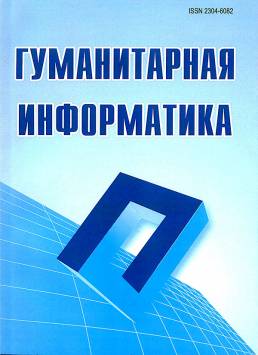SELF-IDENTIFICATION IN I-COMMUNICATION: PROBLEM STATEMENT(SOCIOLINGUISTIC ASPECT)
The period of the past 15 years has seen rapid evolution of IT (information technologies) in Russia and abroad. It is obvious that the new computer technologies firstly worked out to operate with data have also involved with the new forms of communication which have a profound influence on the search of identity by a certain individual. This article integrates findings from interdisciplinary investigations in Russia, the US, and Europe to determine whether there are similar patterns of self-identification on the Internet and in RL (real life) and to what degree an identity can be affected by virtual communication.
Keywords
Authors
Всего: 1
References
Turkle Sherry. Constructions and Reconstructions of the Self in Virtual Reality/ Massachusetts Institute of Technology. Idenity workshop. 1997.
Turkle Sherry. Life on the Screen: Identity in the Age of the Internet. New York: Simon and Schuster, 1995.
Suler, J.R. (2002). Identity Management in Cyberspace <http://www-usr.rider.edu/~suler/psycyber/identitymanage.html>. Journal of Applied Psychoanalytic Studies, 4, 455-460.
Suler, J. (2004). Computer and cyberspace addiction <http://www-usr.rider.edu/~suler/psycyber/cybaddict.html>. International Journal of Applied Psychoanalytic Studies, 1, 359-362.
Heim Michael. The Metaphysics of virtual reality // Virtual reality: theory, practice and promise / Ed. Sandra K. Helsel and Judith Paris Roth.Meckler. Westport and London (1991). P. 27-33.
Bell D. The Coming of Post-Industrial Society. A Venture in Social Forecasting. - N.-Y., - 1973.
Феномен компьютеризации как социологическая проблема. Информационное общество: фантом постиндустриальной эры. http:/www.soc.pu.ru:8101/publications/pts/divanov.htm
Холл К.С., Линдсей Г. Теории личности. - М.,1999, с. 648.
Хантингтон С. Столкновение цивилизаций. М., 2003. с. 32.
Минаков А.В. Некоторые психологические свойства и особенности Интернет как нового слоя реальности. http://www.psychological.ru/lim/obsheprof/psobshen/doc32.html
Микешина Л.А., Опенков М.Ю. Новые образы познания и реальности. - М.: РОССПЭН, 1997, с. 204.
Луман Н. Невероятные коммуникации. Проблемы теоретической социологии. Вып. 3. СПб., 2000, с. 43.
Кон И.С. Открытие «Я». М., Политиздат, 1978 с. 367.
Коплстон Фредерик. История философии. XX век. - М.: 2002, с. 269.
Зиглер Д. <http://www.piter.com/publish/authors/19799/188782044/>, Хьелл Л. <http://www.piter.com/publish/authors/19798/188782044/> Теории личности. 1-е издание, Санкт-Петербург. 1997 год, с. 608.
Заковоротная М.В. Идентичность человека. Социально-философские аспекты. Ростов -на - Дону, Издательство Северо-Кавказского научного центра высшей школы. 1999. - с. 143.
Жичкина А.Е., Белинская Е.П. Самопрезентация в виртуальной коммуникации и особенности идентичности подростков-пользователей Интернета // Образование и информационная культура. Социологические аспекты. Труды по социологии образования. Том V. Выпуск VII / Под ред. В.С.Собкина. - М.: Центр социологии образования РАО, 2000, с. 431-460.
Ветхий завет, Первая книга Моисеева, гл.1, с.1-2.
